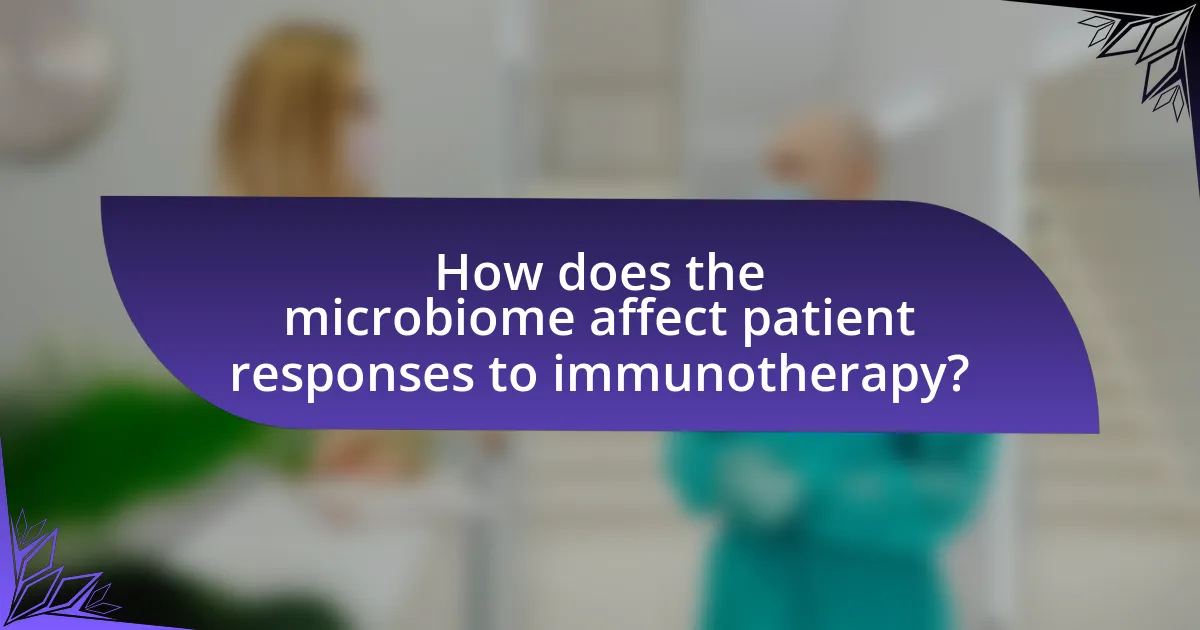The microbiome, a complex community of microorganisms residing in the body, particularly in the gut, plays a crucial role in influencing immunotherapy outcomes. Research indicates that the composition of the microbiome can significantly affect the efficacy of various immunotherapeutic treatments, including checkpoint inhibitors and CAR T-cell therapy. Key components such as microbial diversity, specific bacterial populations, and microbial metabolites are linked to enhanced immune responses and improved treatment efficacy. Understanding the microbiome’s impact on immunotherapy can lead to personalized treatment strategies, optimizing patient selection and potentially improving clinical outcomes.

What is the microbiome and its role in immunotherapy outcomes?
The microbiome refers to the diverse community of microorganisms, including bacteria, fungi, and viruses, that inhabit various environments in the body, particularly the gut. Its role in immunotherapy outcomes is significant, as studies have shown that the composition of the microbiome can influence the efficacy of immunotherapeutic treatments, such as checkpoint inhibitors. For instance, research published in “Science” by Routy et al. (2018) demonstrated that patients with a diverse gut microbiome had improved responses to anti-PD-1 therapy in melanoma, suggesting that specific microbial populations can enhance immune responses against tumors. This evidence indicates that the microbiome not only plays a crucial role in shaping immune system function but also directly impacts the success of immunotherapy.
How does the microbiome influence the immune system?
The microbiome influences the immune system by modulating immune responses and maintaining homeostasis. Specific microbial communities can enhance the production of immune cells, such as T cells and regulatory T cells, which are crucial for immune regulation. Research indicates that the presence of certain gut bacteria, like Bacteroides fragilis, can promote the development of T helper 17 cells, which play a role in combating infections and inflammation. Additionally, the microbiome can affect the efficacy of immunotherapy treatments by altering the immune landscape, as demonstrated in studies where patients with diverse gut microbiota showed better responses to checkpoint inhibitors. This evidence underscores the significant role of the microbiome in shaping immune function and therapeutic outcomes.
What are the key components of the microbiome that affect immunity?
The key components of the microbiome that affect immunity include diverse microbial species, metabolites produced by these microbes, and the interactions between the microbiome and the host immune system. Diverse microbial species, such as bacteria, fungi, and viruses, contribute to immune system development and function by influencing the production of immune cells and cytokines. Metabolites like short-chain fatty acids, produced during the fermentation of dietary fibers by gut bacteria, play a crucial role in modulating immune responses and maintaining gut barrier integrity. Furthermore, the interactions between the microbiome and the host’s immune system can lead to either immune tolerance or activation, impacting susceptibility to infections and autoimmune diseases. Research has shown that a balanced microbiome is essential for optimal immune function, as evidenced by studies linking dysbiosis to increased inflammation and impaired immune responses.
How do microbial metabolites impact immune responses?
Microbial metabolites significantly influence immune responses by modulating the activity of immune cells and altering the inflammatory environment. For instance, short-chain fatty acids (SCFAs), produced by gut bacteria during the fermentation of dietary fibers, enhance the production of anti-inflammatory cytokines and promote regulatory T cell differentiation, which helps maintain immune homeostasis. Research has shown that SCFAs can inhibit histone deacetylases, leading to changes in gene expression that favor immune tolerance. Additionally, metabolites like indole, derived from tryptophan by gut microbes, can enhance the function of dendritic cells and promote T cell activation. These interactions illustrate how microbial metabolites play a crucial role in shaping immune responses, thereby impacting overall health and disease outcomes.
What types of immunotherapy are affected by the microbiome?
The types of immunotherapy affected by the microbiome include checkpoint inhibitors, CAR T-cell therapy, and cancer vaccines. Research indicates that the gut microbiome can influence the efficacy of checkpoint inhibitors, such as anti-PD-1 and anti-CTLA-4 therapies, by modulating immune responses. For instance, a study published in “Science” by Routy et al. (2018) demonstrated that specific gut bacteria can enhance the response to these therapies in melanoma patients. Additionally, the microbiome has been shown to impact the effectiveness of CAR T-cell therapy by affecting T-cell function and persistence, as highlighted in research published in “Nature” by Gopalakrishnan et al. (2018). Cancer vaccines also exhibit variability in effectiveness based on microbiome composition, as certain microbial profiles can enhance immune activation.
How does the microbiome interact with checkpoint inhibitors?
The microbiome interacts with checkpoint inhibitors by modulating the immune response, which can enhance the efficacy of these therapies. Specific gut bacteria, such as Bifidobacterium and Akkermansia, have been shown to influence the response to checkpoint inhibitors by promoting T-cell activation and increasing the production of anti-tumor immune responses. Studies indicate that patients with diverse gut microbiota tend to have better clinical outcomes when treated with checkpoint inhibitors, as evidenced by research published in “Science” by Routy et al. (2018), which demonstrated that antibiotic use negatively impacted treatment efficacy by altering the microbiome composition.
What is the relationship between the microbiome and CAR T-cell therapy?
The microbiome significantly influences the efficacy of CAR T-cell therapy. Research indicates that a diverse and balanced microbiome can enhance the therapeutic response by modulating the immune system and improving the persistence and function of CAR T-cells. For instance, a study published in “Nature” by Matson et al. (2018) demonstrated that specific gut microbiota can enhance anti-tumor immunity and improve outcomes in cancer therapies, including CAR T-cell treatments. This relationship underscores the importance of the microbiome in optimizing immunotherapy outcomes.
Why is understanding the microbiome important for improving immunotherapy outcomes?
Understanding the microbiome is crucial for improving immunotherapy outcomes because it significantly influences the immune system’s response to treatment. Research indicates that specific gut microbiota can enhance the efficacy of immunotherapy by modulating immune responses, promoting anti-tumor activity, and reducing adverse effects. For instance, a study published in “Science” by Gopalakrishnan et al. (2018) demonstrated that patients with melanoma who had a diverse gut microbiome responded better to anti-PD-1 therapy compared to those with less diversity. This evidence underscores the microbiome’s role in shaping the effectiveness of immunotherapeutic strategies.
How can microbiome profiling enhance patient selection for immunotherapy?
Microbiome profiling can enhance patient selection for immunotherapy by identifying specific microbial signatures that correlate with treatment response. Research indicates that certain gut microbiota, such as Faecalibacterium and Bifidobacterium, are associated with improved outcomes in patients receiving immune checkpoint inhibitors. For instance, a study published in “Science” by Routy et al. (2018) demonstrated that patients with a diverse gut microbiome had better responses to anti-PD-1 therapy, suggesting that microbiome composition can serve as a predictive biomarker for immunotherapy efficacy. By utilizing microbiome profiling, clinicians can tailor immunotherapy approaches to individual patients, potentially increasing the likelihood of successful treatment outcomes.
What are the potential implications of microbiome modulation in treatment strategies?
Microbiome modulation has significant implications for treatment strategies, particularly in enhancing immunotherapy outcomes. Research indicates that the gut microbiome influences the efficacy of immune checkpoint inhibitors, as specific microbial populations can enhance anti-tumor immunity. For instance, a study published in “Science” by Routy et al. (2018) demonstrated that patients with diverse gut microbiota had improved responses to anti-PD-1 therapy, suggesting that microbiome composition can predict treatment success. Additionally, microbiome modulation through probiotics or dietary interventions may optimize therapeutic responses by promoting beneficial microbial communities that support immune function. Thus, understanding and manipulating the microbiome could lead to more effective and personalized treatment strategies in immunotherapy.

How does the microbiome affect patient responses to immunotherapy?
The microbiome significantly influences patient responses to immunotherapy by modulating immune system activity and treatment efficacy. Research indicates that a diverse microbiome can enhance the effectiveness of immune checkpoint inhibitors, as seen in studies where patients with a rich microbial diversity exhibited better clinical outcomes compared to those with less diversity. For instance, a study published in “Science” by Gopalakrishnan et al. (2018) demonstrated that specific gut bacteria, such as Bifidobacterium and Akkermansia, were associated with improved responses to anti-PD-1 therapy in melanoma patients. This suggests that the microbiome can alter the immune landscape, potentially leading to enhanced anti-tumor immunity and better therapeutic responses.
What factors influence the variability of microbiome composition in patients?
The variability of microbiome composition in patients is influenced by factors such as diet, genetics, environment, medication, and lifestyle. Diet plays a crucial role, as different food types can promote the growth of specific microbial communities; for instance, a high-fiber diet is associated with increased diversity in gut microbiota. Genetics also contributes, with studies indicating that heritable factors can shape microbial populations. Environmental factors, including geographical location and exposure to pollutants, further affect microbiome diversity. Additionally, medications, particularly antibiotics, can drastically alter microbial composition by reducing diversity and promoting resistant strains. Lifestyle choices, such as physical activity and stress levels, also impact microbiome variability, as they can influence gut health and microbial interactions. These factors collectively underscore the complexity of microbiome composition in patients.
How do diet and lifestyle impact the microbiome?
Diet and lifestyle significantly impact the microbiome by influencing its composition and diversity. A diet rich in fiber, fruits, and vegetables promotes beneficial bacteria, while high-fat and high-sugar diets can lead to dysbiosis, characterized by an imbalance of microbial communities. Research indicates that individuals consuming a Mediterranean diet, which is high in plant-based foods, have a more diverse microbiome, which is associated with better health outcomes. Additionally, lifestyle factors such as physical activity and stress management can also affect microbial diversity; for instance, regular exercise has been shown to enhance gut microbiota diversity, which is linked to improved immune function.
What role do antibiotics play in shaping the microbiome before treatment?
Antibiotics significantly alter the microbiome before treatment by reducing microbial diversity and disrupting the balance of beneficial and harmful bacteria. This alteration can lead to a decrease in the overall microbial population, which is crucial for maintaining immune function and metabolic processes. Research indicates that antibiotics can create an environment conducive to the overgrowth of pathogenic bacteria, potentially compromising the effectiveness of subsequent treatments, such as immunotherapy. For instance, a study published in “Nature” by K. A. McCoy et al. (2020) demonstrated that antibiotic-induced changes in the gut microbiome negatively impacted the response to immunotherapy in cancer patients, highlighting the critical role of a healthy microbiome in treatment outcomes.
How can the microbiome predict treatment efficacy in immunotherapy?
The microbiome can predict treatment efficacy in immunotherapy by influencing the immune response and modulating the tumor microenvironment. Specific microbial communities have been associated with improved responses to immunotherapy, as evidenced by studies showing that patients with diverse gut microbiota tend to have better clinical outcomes. For instance, research published in “Science” by Routy et al. (2018) demonstrated that the presence of certain bacteria, such as Faecalibacterium and Akkermansia, correlates with enhanced efficacy of immune checkpoint inhibitors in melanoma patients. This indicates that the microbiome plays a crucial role in shaping the immune system’s ability to recognize and attack tumors, thereby serving as a predictive biomarker for treatment success in immunotherapy.
What biomarkers related to the microbiome are associated with better outcomes?
Biomarkers related to the microbiome that are associated with better outcomes include specific microbial taxa such as Faecalibacterium prausnitzii and Akkermansia muciniphila. These taxa have been linked to enhanced immune responses and improved efficacy of immunotherapy treatments. Research indicates that higher levels of Faecalibacterium prausnitzii correlate with reduced inflammation and better clinical responses in cancer patients undergoing immunotherapy, while Akkermansia muciniphila has been associated with improved metabolic health and immune modulation. Studies, such as those published in “Nature” by Routy et al. (2018), demonstrate that a diverse microbiome composition, particularly the presence of these beneficial bacteria, can significantly influence treatment outcomes in cancer therapies.
How does the microbiome correlate with adverse effects of immunotherapy?
The microbiome correlates with adverse effects of immunotherapy by influencing the immune response and treatment efficacy. Specific microbial communities can modulate the host’s immune system, potentially leading to increased toxicity or reduced effectiveness of immunotherapeutic agents. For instance, studies have shown that certain gut bacteria, such as Bacteroides and Firmicutes, can enhance the immune response to cancer therapies, while dysbiosis—an imbalance in microbial populations—has been linked to higher rates of adverse events in patients undergoing immunotherapy. Research published in “Science” by Routy et al. (2018) demonstrated that patients with a diverse gut microbiome experienced fewer immune-related adverse events compared to those with less microbial diversity, highlighting the microbiome’s significant role in shaping treatment outcomes.

What strategies can be employed to leverage the microbiome in immunotherapy?
Strategies to leverage the microbiome in immunotherapy include the use of probiotics, fecal microbiota transplantation (FMT), and the development of microbiome-modulating drugs. Probiotics can enhance the efficacy of immune checkpoint inhibitors by promoting a favorable immune response, as demonstrated in studies where specific strains improved treatment outcomes in melanoma patients. FMT has shown potential in restoring microbial diversity and enhancing responses to immunotherapy, evidenced by research indicating improved survival rates in patients receiving FMT alongside cancer treatments. Additionally, microbiome-modulating drugs aim to selectively alter gut microbiota composition to optimize immune responses, with ongoing clinical trials exploring their effectiveness in conjunction with various immunotherapeutic agents.
How can probiotics and prebiotics be used to enhance immunotherapy outcomes?
Probiotics and prebiotics can enhance immunotherapy outcomes by modulating the immune system and improving gut microbiota diversity. Research indicates that a balanced gut microbiome can influence the efficacy of immunotherapy treatments, such as checkpoint inhibitors. For instance, a study published in “Science” by Routy et al. (2018) demonstrated that patients with a diverse gut microbiome had better responses to anti-PD-1 therapy, suggesting that probiotics can help restore this diversity. Additionally, prebiotics can promote the growth of beneficial bacteria, further supporting immune function and potentially leading to improved therapeutic responses.
What evidence supports the use of probiotics in cancer treatment?
Evidence supporting the use of probiotics in cancer treatment includes studies demonstrating their ability to enhance the efficacy of immunotherapy and reduce treatment-related side effects. For instance, a study published in the journal “Nature” by Gopalakrishnan et al. (2018) found that patients with melanoma who had a diverse gut microbiome, influenced by probiotic intake, responded better to anti-PD-1 therapy. Additionally, a meta-analysis in “Cancer Medicine” by Zhang et al. (2020) indicated that probiotics can alleviate chemotherapy-induced gastrointestinal toxicity, improving overall patient quality of life. These findings suggest that probiotics may play a beneficial role in cancer treatment by modulating the immune response and mitigating adverse effects.
How do prebiotics contribute to a favorable microbiome environment?
Prebiotics contribute to a favorable microbiome environment by serving as food sources for beneficial gut bacteria, promoting their growth and activity. This enhancement of beneficial bacteria helps to maintain a balanced microbiome, which is crucial for optimal immune function. Research indicates that prebiotics can increase the abundance of specific beneficial bacteria, such as Bifidobacteria and Lactobacilli, which are associated with improved gut health and immune responses. A study published in the journal “Frontiers in Microbiology” by Slavin (2013) highlights that prebiotics can modulate the gut microbiota composition, leading to enhanced production of short-chain fatty acids (SCFAs) that support gut barrier integrity and immune modulation.
What are the challenges in integrating microbiome research into clinical practice?
Integrating microbiome research into clinical practice faces several challenges, including variability in individual microbiomes, lack of standardized methodologies, and insufficient clinical evidence linking microbiome profiles to treatment outcomes. Individual microbiomes differ significantly due to factors such as diet, genetics, and environment, complicating the development of universal treatment protocols. Additionally, the absence of standardized methods for microbiome analysis hinders reproducibility and comparability of results across studies. Furthermore, while some studies suggest correlations between microbiome composition and immunotherapy efficacy, robust clinical evidence is still limited, making it difficult for healthcare providers to adopt microbiome-based interventions confidently.
How can clinicians effectively monitor microbiome changes during treatment?
Clinicians can effectively monitor microbiome changes during treatment by utilizing advanced sequencing technologies, such as 16S rRNA gene sequencing and metagenomic sequencing. These methods allow for comprehensive profiling of microbial communities, enabling clinicians to detect shifts in microbiome composition and diversity that may correlate with treatment responses. Research has shown that specific microbial signatures can predict immunotherapy outcomes, highlighting the importance of continuous microbiome assessment. For instance, a study published in “Science” by Routy et al. (2018) demonstrated that patients with a diverse gut microbiome had improved responses to anti-PD-1 therapy, underscoring the relevance of microbiome monitoring in clinical settings.
What are the ethical considerations in microbiome manipulation for therapy?
Ethical considerations in microbiome manipulation for therapy include issues of consent, potential long-term effects, and the risk of unintended consequences. Informed consent is crucial, as patients must understand the implications of altering their microbiome, including possible health risks and benefits. Additionally, the long-term effects of such manipulations are often unknown, raising concerns about the sustainability of these therapies. Research indicates that microbiome alterations can lead to significant changes in host physiology, which may result in unforeseen health issues (e.g., the study by Zmora et al., 2018, published in Cell, highlights the complex interactions between microbiome changes and host health). Furthermore, ethical dilemmas arise regarding equity in access to these therapies, as not all populations may benefit equally from microbiome manipulation.
What practical steps can patients take to optimize their microbiome for immunotherapy?
Patients can optimize their microbiome for immunotherapy by incorporating a diverse diet rich in fiber, fermented foods, and probiotics. A diverse diet enhances microbial diversity, which is associated with improved immune responses. Research indicates that high-fiber foods, such as fruits, vegetables, and whole grains, promote beneficial gut bacteria, while fermented foods like yogurt and kimchi introduce live microorganisms that can positively influence gut health. Additionally, studies have shown that probiotics can enhance the efficacy of immunotherapy by modulating the immune system and improving treatment outcomes. For instance, a study published in “Nature” by Routy et al. (2018) demonstrated that patients receiving immunotherapy who had a higher abundance of certain gut bacteria had better clinical responses. Therefore, focusing on these dietary changes can significantly impact the microbiome and potentially improve immunotherapy effectiveness.



